Xueguang Ma
LACONIC: Dense-Level Effectiveness for Scalable Sparse Retrieval via a Two-Phase Training Curriculum
Jan 04, 2026Abstract:While dense retrieval models have become the standard for state-of-the-art information retrieval, their deployment is often constrained by high memory requirements and reliance on GPU accelerators for vector similarity search. Learned sparse retrieval offers a compelling alternative by enabling efficient search via inverted indices, yet it has historically received less attention than dense approaches. In this report, we introduce LACONIC, a family of learned sparse retrievers based on the Llama-3 architecture (1B, 3B, and 8B). We propose a streamlined two-phase training curriculum consisting of (1) weakly supervised pre-finetuning to adapt causal LLMs for bidirectional contextualization and (2) high-signal finetuning using curated hard negatives. Our results demonstrate that LACONIC effectively bridges the performance gap with dense models: the 8B variant achieves a state-of-the-art 60.2 nDCG on the MTEB Retrieval benchmark, ranking 15th on the leaderboard as of January 1, 2026, while utilizing 71\% less index memory than an equivalent dense model. By delivering high retrieval effectiveness on commodity CPU hardware with a fraction of the compute budget required by competing models, LACONIC provides a scalable and efficient solution for real-world search applications.
MAGMaR Shared Task System Description: Video Retrieval with OmniEmbed
Jun 11, 2025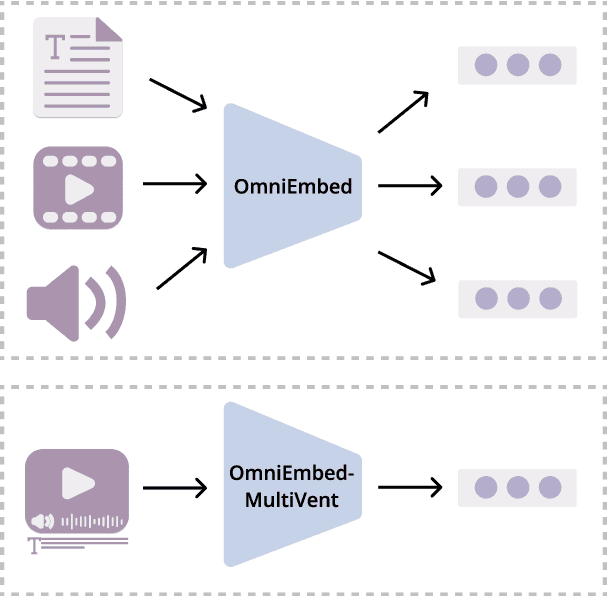
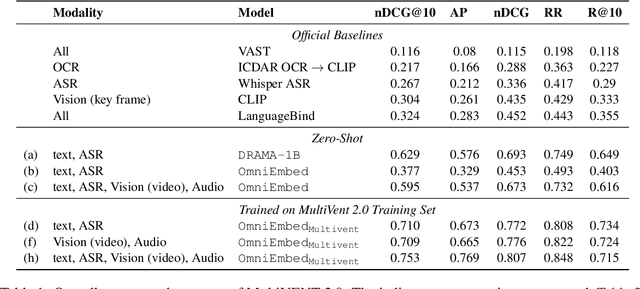
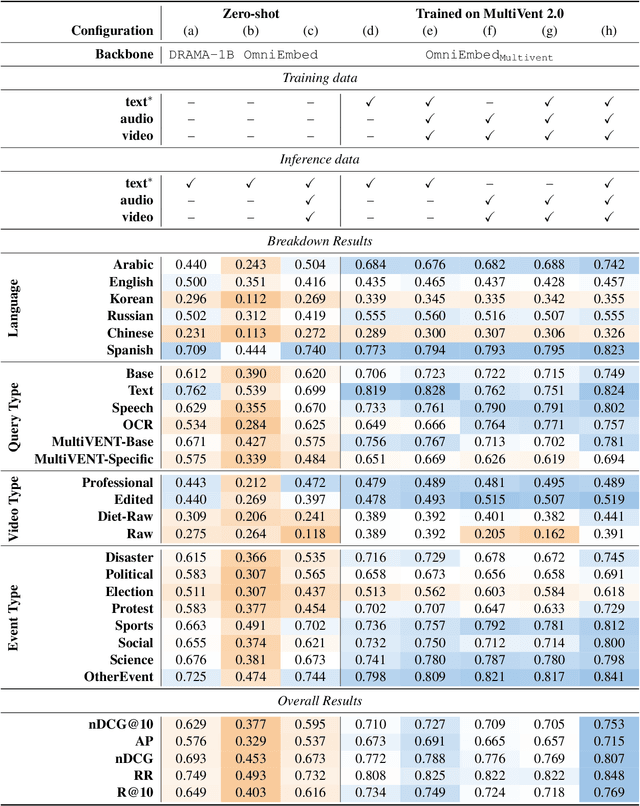
Abstract:Effective video retrieval remains challenging due to the complexity of integrating visual, auditory, and textual modalities. In this paper, we explore unified retrieval methods using OmniEmbed, a powerful multimodal embedding model from the Tevatron 2.0 toolkit, in the context of the MAGMaR shared task. Evaluated on the comprehensive MultiVENT 2.0 dataset, OmniEmbed generates unified embeddings for text, images, audio, and video, enabling robust multimodal retrieval. By finetuning OmniEmbed with the combined multimodal data--visual frames, audio tracks, and textual descriptions provided in MultiVENT 2.0, we achieve substantial improvements in complex, multilingual video retrieval tasks. Our submission achieved the highest score on the MAGMaR shared task leaderboard among public submissions as of May 20th, 2025, highlighting the practical effectiveness of our unified multimodal retrieval approach. Model checkpoint in this work is opensourced.
Fixing Data That Hurts Performance: Cascading LLMs to Relabel Hard Negatives for Robust Information Retrieval
May 22, 2025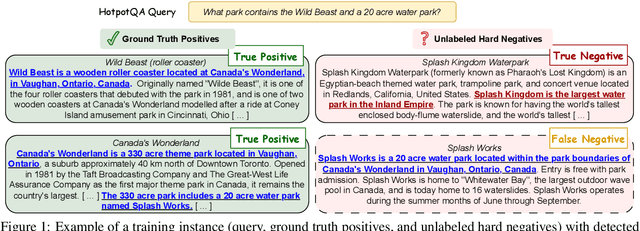
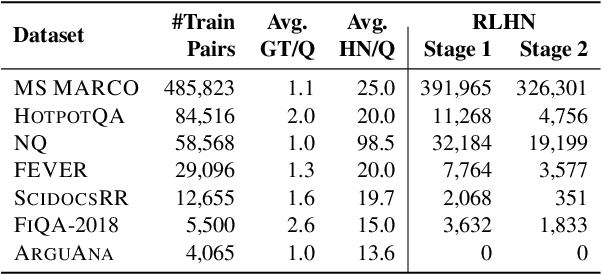

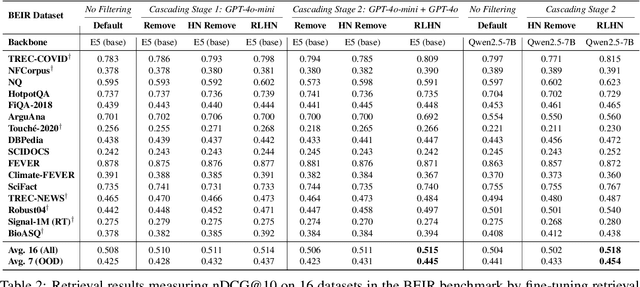
Abstract:Training robust retrieval and reranker models typically relies on large-scale retrieval datasets; for example, the BGE collection contains 1.6 million query-passage pairs sourced from various data sources. However, we find that certain datasets can negatively impact model effectiveness -- pruning 8 out of 15 datasets from the BGE collection reduces the training set size by 2.35$\times$ and increases nDCG@10 on BEIR by 1.0 point. This motivates a deeper examination of training data quality, with a particular focus on "false negatives", where relevant passages are incorrectly labeled as irrelevant. We propose a simple, cost-effective approach using cascading LLM prompts to identify and relabel hard negatives. Experimental results show that relabeling false negatives with true positives improves both E5 (base) and Qwen2.5-7B retrieval models by 0.7-1.4 nDCG@10 on BEIR and by 1.7-1.8 nDCG@10 on zero-shot AIR-Bench evaluation. Similar gains are observed for rerankers fine-tuned on the relabeled data, such as Qwen2.5-3B on BEIR. The reliability of the cascading design is further supported by human annotation results, where we find judgment by GPT-4o shows much higher agreement with humans than GPT-4o-mini.
General-Reasoner: Advancing LLM Reasoning Across All Domains
May 21, 2025



Abstract:Reinforcement learning (RL) has recently demonstrated strong potential in enhancing the reasoning capabilities of large language models (LLMs). Particularly, the "Zero" reinforcement learning introduced by Deepseek-R1-Zero, enables direct RL training of base LLMs without relying on an intermediate supervised fine-tuning stage. Despite these advancements, current works for LLM reasoning mainly focus on mathematical and coding domains, largely due to data abundance and the ease of answer verification. This limits the applicability and generalization of such models to broader domains, where questions often have diverse answer representations, and data is more scarce. In this paper, we propose General-Reasoner, a novel training paradigm designed to enhance LLM reasoning capabilities across diverse domains. Our key contributions include: (1) constructing a large-scale, high-quality dataset of questions with verifiable answers curated by web crawling, covering a wide range of disciplines; and (2) developing a generative model-based answer verifier, which replaces traditional rule-based verification with the capability of chain-of-thought and context-awareness. We train a series of models and evaluate them on a wide range of datasets covering wide domains like physics, chemistry, finance, electronics etc. Our comprehensive evaluation across these 12 benchmarks (e.g. MMLU-Pro, GPQA, SuperGPQA, TheoremQA, BBEH and MATH AMC) demonstrates that General-Reasoner outperforms existing baseline methods, achieving robust and generalizable reasoning performance while maintaining superior effectiveness in mathematical reasoning tasks.
Tevatron 2.0: Unified Document Retrieval Toolkit across Scale, Language, and Modality
May 05, 2025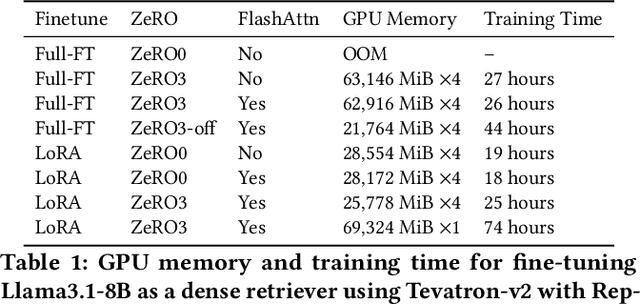
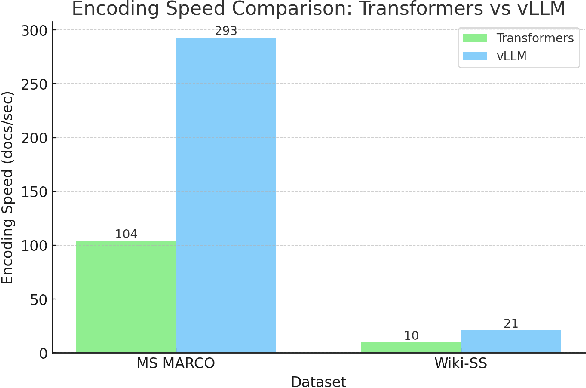
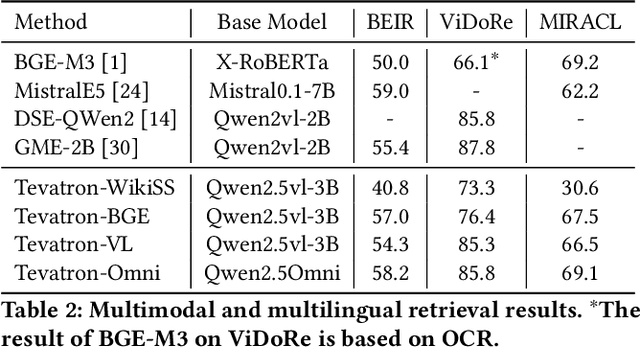
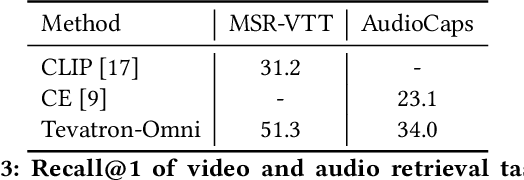
Abstract:Recent advancements in large language models (LLMs) have driven interest in billion-scale retrieval models with strong generalization across retrieval tasks and languages. Additionally, progress in large vision-language models has created new opportunities for multimodal retrieval. In response, we have updated the Tevatron toolkit, introducing a unified pipeline that enables researchers to explore retriever models at different scales, across multiple languages, and with various modalities. This demo paper highlights the toolkit's key features, bridging academia and industry by supporting efficient training, inference, and evaluation of neural retrievers. We showcase a unified dense retriever achieving strong multilingual and multimodal effectiveness, and conduct a cross-modality zero-shot study to demonstrate its research potential. Alongside, we release OmniEmbed, to the best of our knowledge, the first embedding model that unifies text, image document, video, and audio retrieval, serving as a baseline for future research.
ScholarCopilot: Training Large Language Models for Academic Writing with Accurate Citations
Apr 03, 2025Abstract:Academic writing requires both coherent text generation and precise citation of relevant literature. Although recent Retrieval-Augmented Generation (RAG) systems have significantly improved factual accuracy in general-purpose text generation, their ability to support professional academic writing remains limited. In this work, we introduce ScholarCopilot, a unified framework designed to enhance existing large language models for generating professional academic articles with accurate and contextually relevant citations. ScholarCopilot dynamically determines when to retrieve scholarly references by generating a retrieval token [RET], which is then used to query a citation database. The retrieved references are fed into the model to augment the generation process. We jointly optimize both the generation and citation tasks within a single framework to improve efficiency. Our model is built upon Qwen-2.5-7B and trained on 500K papers from arXiv. It achieves a top-1 retrieval accuracy of 40.1% on our evaluation dataset, outperforming baselines such as E5-Mistral-7B-Instruct (15.0%) and BM25 (9.8%). On a dataset of 1,000 academic writing samples, ScholarCopilot scores 16.2/25 in generation quality -- measured across relevance, coherence, academic rigor, completeness, and innovation -- significantly surpassing all existing models, including much larger ones like the Retrieval-Augmented Qwen2.5-72B-Instruct. Human studies further demonstrate that ScholarCopilot, despite being a 7B model, significantly outperforms ChatGPT, achieving 100% preference in citation quality and over 70% in overall usefulness.
Rank-R1: Enhancing Reasoning in LLM-based Document Rerankers via Reinforcement Learning
Mar 08, 2025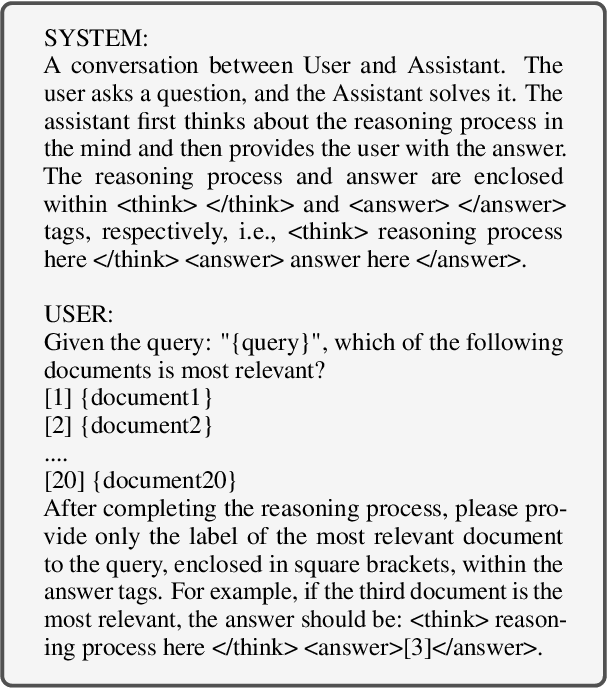
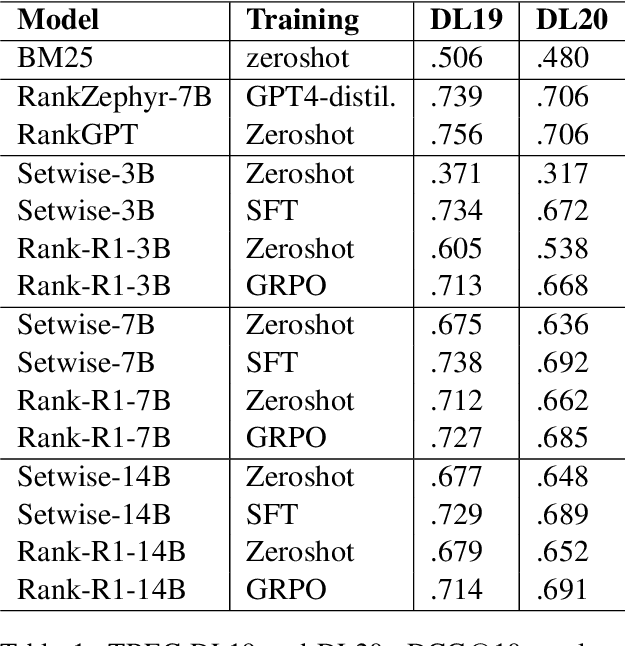
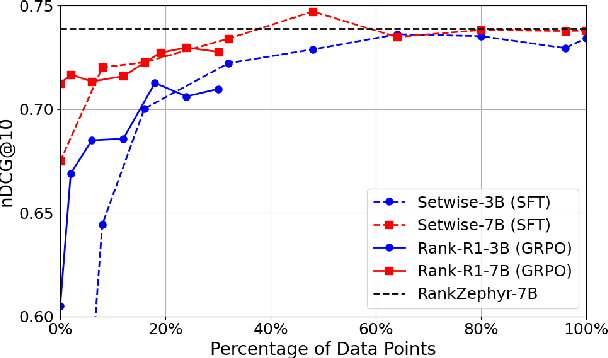
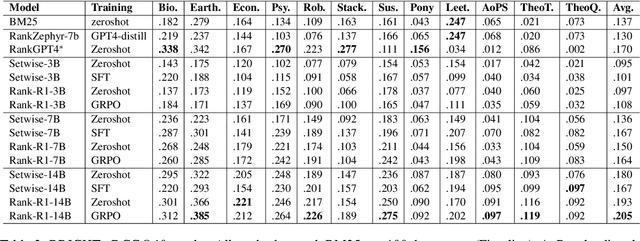
Abstract:In this paper, we introduce Rank-R1, a novel LLM-based reranker that performs reasoning over both the user query and candidate documents before performing the ranking task. Existing document reranking methods based on large language models (LLMs) typically rely on prompting or fine-tuning LLMs to order or label candidate documents according to their relevance to a query. For Rank-R1, we use a reinforcement learning algorithm along with only a small set of relevance labels (without any reasoning supervision) to enhance the reasoning ability of LLM-based rerankers. Our hypothesis is that adding reasoning capabilities to the rerankers can improve their relevance assessement and ranking capabilities. Our experiments on the TREC DL and BRIGHT datasets show that Rank-R1 is highly effective, especially for complex queries. In particular, we find that Rank-R1 achieves effectiveness on in-domain datasets at par with that of supervised fine-tuning methods, but utilizing only 18\% of the training data used by the fine-tuning methods. We also find that the model largely outperforms zero-shot and supervised fine-tuning when applied to out-of-domain datasets featuring complex queries, especially when a 14B-size model is used. Finally, we qualitatively observe that Rank-R1's reasoning process improves the explainability of the ranking results, opening new opportunities for search engine results presentation and fruition.
DRAMA: Diverse Augmentation from Large Language Models to Smaller Dense Retrievers
Feb 25, 2025
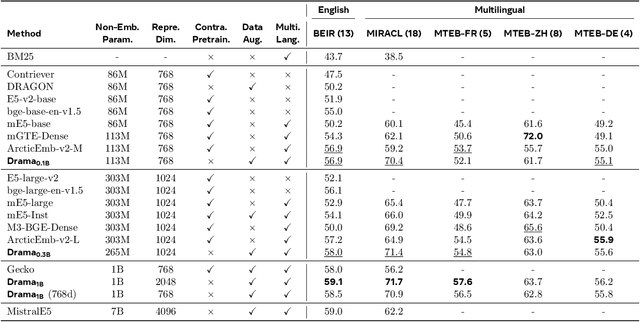

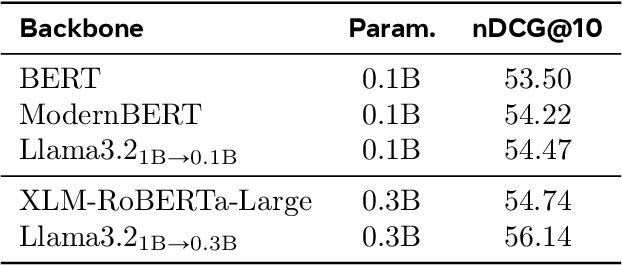
Abstract:Large language models (LLMs) have demonstrated strong effectiveness and robustness while fine-tuned as dense retrievers. However, their large parameter size brings significant inference time computational challenges, including high encoding costs for large-scale corpora and increased query latency, limiting their practical deployment. While smaller retrievers offer better efficiency, they often fail to generalize effectively with limited supervised fine-tuning data. In this work, we introduce DRAMA, a training framework that leverages LLMs to train smaller generalizable dense retrievers. In particular, we adopt pruned LLMs as the backbone and train on diverse LLM-augmented data in a single-stage contrastive learning setup. Experiments show that DRAMA offers better multilingual and long-context capabilities than traditional encoder-based retrievers, and achieves strong performance across multiple tasks and languages. These highlight the potential of connecting the training of smaller retrievers with the growing advancements in LLMs, bridging the gap between efficiency and generalization.
PixelWorld: Towards Perceiving Everything as Pixels
Jan 31, 2025Abstract:Existing foundation models typically process visual input as pixels and textual input as tokens, a paradigm that contrasts with human perception, where both modalities are processed in a unified manner. With the rise of embodied and agentic AI, where inputs primarily come from camera pixels, the need for a unified perception framework becomes increasingly evident. In this paper, we propose to unify all modalities (text, tables, code, diagrams, images, etc) as pixel inputs, i.e. "Perceive Everything as Pixels" (PEAP). We introduce PixelWorld, a novel evaluation suite that unifies all the mentioned modalities into pixel space to gauge the existing models' performance. Our findings show that (1) PEAP outperforms baseline with token-based input in multimodal datasets, benefiting from unified input for better disambiguation, (2) significant declines in reasoning and coding capabilities across all models when processing pixel-based input, underscoring the need to enhance foundation models' perceptual abilities, (3) larger models can maintain strong performance on non-reasoning tasks under PEAP, while smaller models like Phi-3.5-V suffer significant performance degradation, (4) the attention pattern of PEAP is highly aligned with text token input, (5) PEAP can be accelerated significantly by exploiting the spatial sparsity. We conclude that the existing frontier models are competent in pixel perception, however, there is still headroom for improvement. Our code, dataset will be released upon acceptance.
Document Screenshot Retrievers are Vulnerable to Pixel Poisoning Attacks
Jan 28, 2025
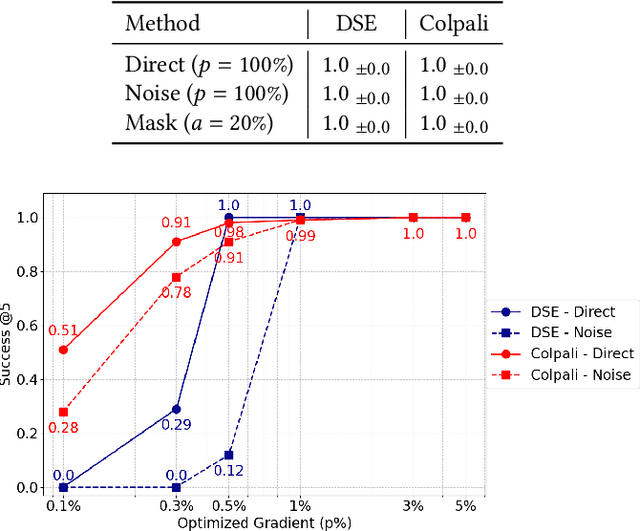


Abstract:Recent advancements in dense retrieval have introduced vision-language model (VLM)-based retrievers, such as DSE and ColPali, which leverage document screenshots embedded as vectors to enable effective search and offer a simplified pipeline over traditional text-only methods. In this study, we propose three pixel poisoning attack methods designed to compromise VLM-based retrievers and evaluate their effectiveness under various attack settings and parameter configurations. Our empirical results demonstrate that injecting even a single adversarial screenshot into the retrieval corpus can significantly disrupt search results, poisoning the top-10 retrieved documents for 41.9% of queries in the case of DSE and 26.4% for ColPali. These vulnerability rates notably exceed those observed with equivalent attacks on text-only retrievers. Moreover, when targeting a small set of known queries, the attack success rate raises, achieving complete success in certain cases. By exposing the vulnerabilities inherent in vision-language models, this work highlights the potential risks associated with their deployment.
 Add to Chrome
Add to Chrome Add to Firefox
Add to Firefox Add to Edge
Add to Edge